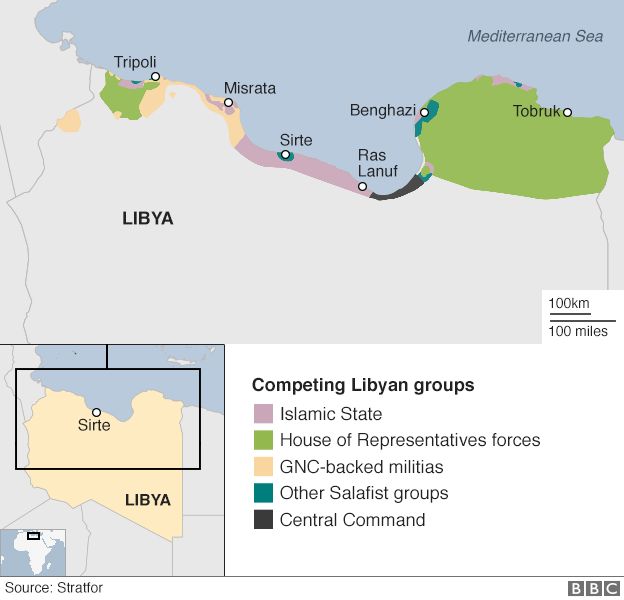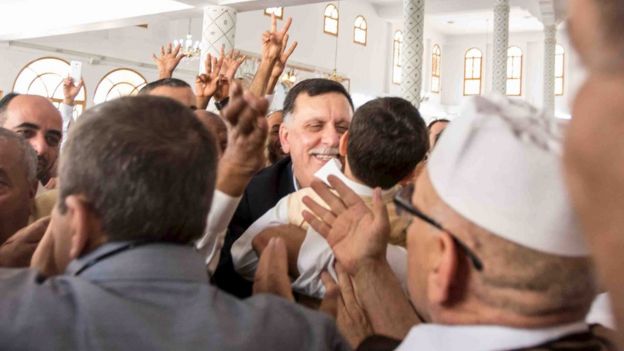This article is more than
8 year oldTripoli holds its breath as new Libya government seeks unity
It's five years since his palaces, private fairground, and security headquarters were pounded by Nato air strikes. Since then the complex appears to have been overlooked like - some say - Libya itself.
Now the international community is paying attention. The so-called Islamic State is in residence in Gaddafi's former hometown of Sirte, and waves of migrants are leaving Libya for Europe. Once again, the fate of Libya is a key concern for the West.
Enter the new "unity" government, albeit with some difficulty.
It came to the capital by boat at the end of March after rivals closed the airspace.
"The challenge of arriving was daunting," said Deputy Prime Minister Mousa al-Koni. "But thanks to God and the Navy Seals, we managed to carry out this operation and enter Tripoli."
Divided Libya:

The optimistically named Government of National Accord is operating f-rom a heavily guarded naval base. It has the backing of the United Nations but it also has rivals. There are two other governments in Libya - one led by Islamists in Tripoli and an internationally recognised administration in Tobruk, in the east.
Then there's the multitude of militias. Having carved up the country, they are not keen to let go their grip.
"We face many challenges starting with taking over ministries and premises occupied by militias and getting the army and police into operation," said Mr Koni. "They have started assuming their responsibilities and are already taking control of some streets and buildings. We have high hopes."
He is blunt about the threat posed by Islamic state, which he says could take control of much of the country.
"Libya does not have a strong figure who can lead the army or even the militias to fight this enemy," he said.
"They will spread quickly, especially in the south. This area is weak and they could occupy it in minutes. If so, they will control two thirds of the country. If we don't act today we can't do anything tomorrow."
'Give us one government and one Libya'
We joined one militia, the Nawasi Brigade, for a night patrol along the coast road in Tripoli. Heavily armed men in uniform set out in a convoy of police cars and other vehicles with blue lights flashing. It looked like an operation by regular police. The Nawasi Brigade is working with Libya's interior ministry but many militias are a law unto themselves.
"Less than 50% follow orders," said Hussam Mohammed, an interior ministry spokesman for Southern Tripoli. He reluctantly admitted that only about 10 militias have been trained and integrated into the ministry. Like many in Libya, he is calling for unity.
"Just give us one government, and one Libya, under one president. I will protect this government. Now we will wait to see what they can give us. But the people won't wait forever."

Image captionFayez Seraj, the head of the unity government, meets supporters at a mosque in Tripoli
"They won't do much for the people but at least they will put us on the first step," he said.
"We saw in the faces of the people that they are smiling. They were happy with the government when they came here. "
For Mr Kakli, the past five years of turmoil came as no surprise.
"Most people are very disappointed but for me it's normal after a revolution," he says.
"Some other countries took a look time to settle. But people are now fed up with fighting each other. They found out fighting each other is no solution, and they want to move on through politics."
Some of Adel's friends who came back to fight with him lost their lives during the revolution. I asked if they would think it had been worth it.
"Not yet," he said. "We didn't get to the point that we wanted, but always there is hope to become a good country."
Tripoli feels like a city holding its breath - watching and waiting to see if the sea breezes will blow in calm or chaos.
"I'm expecting ups and downs for weeks," one local man told me in Martyrs' Square, whe-re Libyans celebrated the fall of Gaddafi.
"The militias will keep flexing their muscles, trying to get a bigger slice of the cake," he said. "The contest could continue for some time."
He too is hoping the new government can gain a foothold.
"This really is our last chance," he said.
Keywords
Newer articles
<p>Former CNN host discussed ongoing anti-Israel protests on college campuses</p>
Tiffany Haddish Says Common Is the Only Celebrity She's Been 'Entangled' With, Claims He Chased Her for 2 Years
Rihanna Is “Keeping it Real Simple” for This Year’s Met Gala
US Congress threatens ICC over Israel arrest warrants
Kendrick Lamar escalates Drake feud on the scathing diss track, Euphoria
Israel fears Netanyahu's arrest over Gaza war as international court considers warrant
Doja Cat steps onto red carpet in lingerie
Tiger’s heartbreaking daughter revelation
Rwanda must halt ‘support’ for M23 rebels, withdraw troops from DR Congo, says Macron
Over half of Israelis believe Netanyahu should resign immediately - poll
